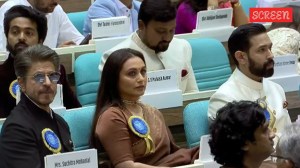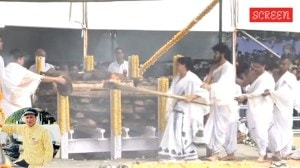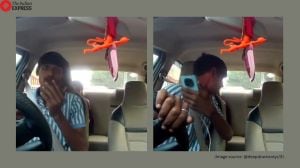EC’s yearend poll plan for Gujarat: SC goes with it
In its face-off with the Election Commission, the Government found itself on the defensive today. Not only did the Supreme Court question it...

In its face-off with the Election Commission, the Government found itself on the defensive today. Not only did the Supreme Court question its interpretation of Article 174, it also forced it to admit that it had no basis to question the EC’s ‘‘factual findings’’ which led it to postpone the Gujarat polls.
On the crucial issue of poll schedule, the court—hearing the Presidential reference—endorsed the EC’s plan to hold elections in November-December provided, of course, conditions are conducive for free and fair polls.
As for the confusion over what happens in the first week of October—whether President’s Rule will replace the caretaker Modi government—the court avoided any direct answers.
All that Chief Justice B N Kirpal, heading the five-judge bench, had to say on this was: ‘‘Every Constitutional authority has to perform its own function.’’
This suggests that the Centre can’t use the reference in dealing with its dilemma over President’s Rule suggested by the EC. This was also underlined by the court’s own remark that ‘‘Gujarat is not the issue before us.’’ However, the Government may seek some solace in the fact that the bench clubbed a PIL on this issue with the reference and scheduled both to be heard next on September 17.
Filed by advocate Umed Singh Gulia, the PIL contends that the Constitution does not provide for a caretaker chief minister.
In another rebuff to the government, the bench, while directing all parties to file their written submissions by September 17, acknowledged that it is ‘‘impossible’’ for the court to give its opinion on the reference by October 2.
This is the date when the six-month rule of Article 174 will stand violated because of the postponement of the elections.
On that issue, too, the Centre was cornered. Solicitor General Harish Salve was asked a hypothetical question by the court: would the Election Commission be bound by the six-month rule of Article 174 if the Gujarat Assembly had been dissolved barely one week before the lapse of that period?
‘‘We can’t wish away these realities while interpreting the Constitution,’’ said Kirpal.
After the Centre admitted that it wasn’t questioning any of the EC’s findings (against the Narendra Modi administration), the bench said that these would be taken to be ‘‘correct and final,’’ and it would only go into questions of law and ‘‘the interplay of Articles 174 and 324.’’
While Article 174 stipulates that there should not be a gap of more than six months between two sessions of an Assembly, Article 324 gives vast discretion to the EC to ensure free and fair elections with expedition.
Photos



- 01
- 02
- 03
- 04
- 05




























